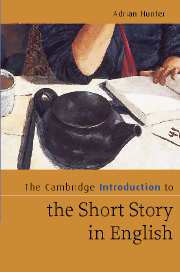Book contents
- Frontmatter
- Contents
- Acknowledgements
- Introduction
- Part I The nineteenth century
- Introduction: publishers, plots and prestige
- Chapter 1 Charles Dickens and Thomas Hardy
- Chapter 2 Rudyard Kipling and Joseph Conrad
- Chapter 3 The Yellow Book circle and the 1890s avant-garde
- Part II The modernist short story
- Part III Post-modernist stories
- Part IV Postcolonial and other stories
- Notes
- Guide to further reading
- Index
- Titles in this series:
Chapter 2 - Rudyard Kipling and Joseph Conrad
Published online by Cambridge University Press: 05 June 2012
- Frontmatter
- Contents
- Acknowledgements
- Introduction
- Part I The nineteenth century
- Introduction: publishers, plots and prestige
- Chapter 1 Charles Dickens and Thomas Hardy
- Chapter 2 Rudyard Kipling and Joseph Conrad
- Chapter 3 The Yellow Book circle and the 1890s avant-garde
- Part II The modernist short story
- Part III Post-modernist stories
- Part IV Postcolonial and other stories
- Notes
- Guide to further reading
- Index
- Titles in this series:
Summary
In a career spanning some six decades, Rudyard Kipling authored in excess of 350 short stories. His first collection, Plain Tales From the Hills, appeared in 1888, his last, Limits and Renewals, in 1932. In the early 1890s, when his stories of India first reached a mass audience, he was hailed as the coming man of English letters. His contemporaries credited him with having reinvented the short story, raising it to the status of a serious art form. He persisted through the high-tide of European modernism and the First World War, continuing to develop in his writing themes and ideas that had detained him in his early work: the relationship between creativity and the imagination, the boundaries between the real and the supernatural, the ideology and workings of empire, the personal and emotional costs of war. He wrote many poems as well as novels, essays and criticism, but the best of his creative energies he saved for the literary form best suited to his particular constellation of talents: the short story.
It is all the more remarkable, then, that the two most influential and eloquent critics of short fiction in the twentieth century, H. E. Bates and Frank O'Connor, should have been so damning of Kipling and his achievement in the form. O'Connor, to be fair, at least pays close attention to the work, identifying the failings of what he calls Kipling's ‘oratorical’ narrative style, his manner of addressing the reader ‘as an audience who, at whatever cost to the artistic properties, must be reduced to tears or laughter or rage’.
- Type
- Chapter
- Information
- The Cambridge Introduction to the Short Story in English , pp. 20 - 31Publisher: Cambridge University PressPrint publication year: 2007



